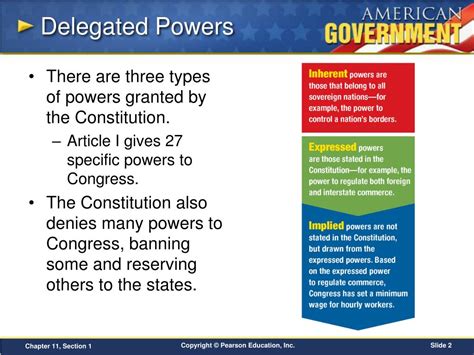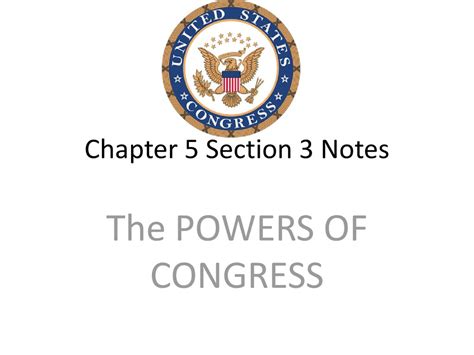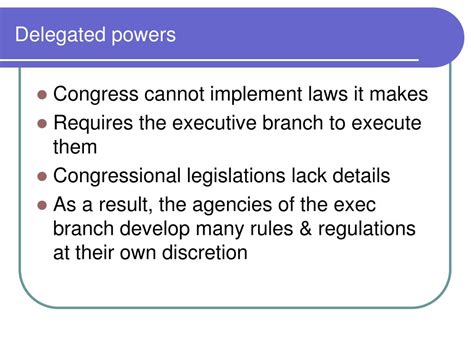Delegated powers refer to the authority granted to an individual, organization, or entity by a higher power or governing body to perform specific tasks, make decisions, or take actions on their behalf. This concept is fundamental in various fields, including law, politics, business, and governance. In essence, delegated powers enable the efficient distribution of responsibilities, allowing for more effective management and decision-making within complex systems.
The notion of delegated powers is rooted in the principle of agency, where one party (the principal) grants authority to another (the agent) to act in their interest. This relationship is built on trust, as the principal relies on the agent's expertise and judgment to make informed decisions. Delegated powers can be found in various forms, such as statutory authority, contractual agreements, or constitutional provisions. For instance, in a parliamentary system, the head of government may delegate powers to ministers or other officials to oversee specific policy areas.
Key Points
- Delegated powers refer to the authority granted by a higher power to perform specific tasks or make decisions.
- This concept is essential in law, politics, business, and governance, enabling efficient distribution of responsibilities.
- Delegated powers are based on the principle of agency, where one party grants authority to another to act in their interest.
- Examples of delegated powers include statutory authority, contractual agreements, and constitutional provisions.
- Effective delegation of powers requires clear communication, defined roles, and a system of accountability.
Types of Delegated Powers

There are several types of delegated powers, each with distinct characteristics and applications. Statutory authority refers to the power granted by a legislative body to an administrative agency or official to regulate specific areas, such as environmental protection or financial regulation. Contractual agreements involve the delegation of powers between parties, outlining the terms and conditions of their relationship. Constitutional provisions establish the framework for delegated powers within a government, defining the roles and responsibilities of different branches and institutions.
Characteristics of Delegated Powers
Delegated powers have several key characteristics that distinguish them from other forms of authority. Firstly, they are derived powers, meaning they originate from a higher power or governing body. Secondly, delegated powers are limited in scope, as they are granted for specific purposes or tasks. Thirdly, they are revocable, allowing the principal to withdraw or modify the delegated authority as needed. Finally, delegated powers are accountable, as the agent is responsible for their actions and decisions to the principal.
| Type of Delegated Power | Characteristics |
|---|---|
| Statutory Authority | Granted by legislative body, limited in scope, revocable |
| Contractual Agreements | Outlines terms and conditions, derived from mutual consent, accountable |
| Constitutional Provisions | Establishes framework for government, defines roles and responsibilities, limited in scope |

Applications of Delegated Powers

Delegated powers have numerous applications across various domains. In business, companies may delegate powers to managers or employees to oversee specific projects or departments. In politics, governments may delegate powers to administrative agencies or international organizations to address global challenges. In law, delegated powers are essential for the functioning of judicial systems, as judges and courts are granted authority to interpret and apply laws.
Challenges and Limitations
While delegated powers offer numerous benefits, they also pose challenges and limitations. One of the primary concerns is the potential for abuse, as agents may exploit their authority for personal gain or to further their own interests. Additionally, delegated powers can lead to conflicts of interest, as agents may face competing demands or loyalties. Finally, the accountability of delegated powers can be problematic, as it may be difficult to monitor and evaluate the actions of agents.
What is the primary purpose of delegated powers?
+The primary purpose of delegated powers is to enable the efficient distribution of responsibilities, allowing for more effective management and decision-making within complex systems.
What are the characteristics of delegated powers?
+Delegated powers are derived powers, limited in scope, revocable, and accountable. They originate from a higher power or governing body, are granted for specific purposes or tasks, can be withdrawn or modified, and are responsible to the principal.
What are the applications of delegated powers?
+Delegated powers have numerous applications across various domains, including business, politics, law, and governance. They enable companies to oversee specific projects or departments, governments to address global challenges, and judicial systems to function effectively.
In conclusion, delegated powers are a fundamental concept in various fields, enabling the efficient distribution of responsibilities and effective management of complex systems. Understanding the characteristics, applications, and challenges of delegated powers is essential for individuals and organizations seeking to navigate the intricacies of authority and decision-making.
